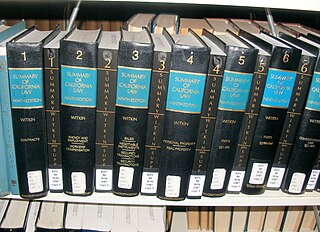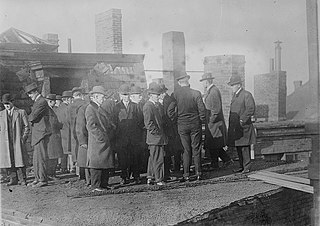Related Research Articles
Perjury is the intentional act of swearing a false oath or falsifying an affirmation to tell the truth, whether spoken or in writing, concerning matters material to an official proceeding. In some jurisdictions, contrary to popular misconception, no crime has occurred when a false statement is made while under oath or subject to penalty. Instead, criminal culpability attaches only at the instant the declarant falsely asserts the truth of statements that are material to the outcome of the proceeding. For example, it is not perjury to lie about one's age except if age is a fact material to influencing the legal result, such as eligibility for old age retirement benefits or whether a person was of an age to have legal capacity.
A statute of limitations, known in civil law systems as a prescriptive period, is a law passed by a legislative body to set the maximum time after an event within which legal proceedings may be initiated.
Vexatious litigation is legal action which is brought solely to harass or subdue an adversary. It may take the form of a primary frivolous lawsuit or may be the repetitive, burdensome, and unwarranted filing of meritless motions in a matter which is otherwise a meritorious cause of action. Filing vexatious litigation is considered an abuse of the judicial process and may result in sanctions against the offender.

The government of California is the governmental structure of the U.S. state of California as established by the California Constitution. It is composed of three branches: the executive, consisting of the Governor of California and the other constitutionally elected and appointed officers and offices; the legislative, consisting of the California State Legislature, which includes the Assembly and the Senate; and the judicial, consisting of the Supreme Court of California and lower courts. There is also local government, consisting of counties, cities, special districts, and school districts, as well as government entities and offices that operate independently on a constitutional, statutory, or common law basis. The state also allows direct participation of the electorate by initiative, referendum, recall and ratification.

Proposition 22 was a law enacted by California voters in March 2000 stating that marriage was between one man and one woman. In November 2008, Proposition 8 was also passed by voters, again only allowing marriage between one man and one woman.
A subpoena duces tecum, or subpoena for production of evidence, is a court summons ordering the recipient to appear before the court and produce documents or other tangible evidence for use at a hearing or trial.
A waiver is the voluntary relinquishment or surrender of some known right or privilege.
Brady disclosure consists of exculpatory or impeaching information and evidence that is material to the guilt or innocence or to the punishment of a defendant. The term comes from the 1963 U.S. Supreme Court case Brady v. Maryland, in which the Supreme Court ruled that suppression by the prosecution of evidence favorable to a defendant who has requested it violates due process.

The State Bar of California is California's official attorney licensing agency. It is responsible for managing the admission of lawyers to the practice of law, investigating complaints of professional misconduct, prescribing appropriate discipline, accepting attorney-member fees, and financially distributing sums paid through attorney trust accounts to fund nonprofit legal entities. It is directly responsible to the Supreme Court of California, however, its Trustees are now appointed by the Supreme Court, the California Legislature, and Governor of California. All attorney admissions are issued as recommendations of the State Bar, which are then routinely ratified by the Supreme Court. Attorney discipline is handled by the State Bar Office of Chief Trial Counsel, which acts as prosecutor before the State Bar Court of California.

"Stop and identify" statutes are laws in several U.S. states that authorize police to lawfully order people whom they reasonably suspect of a crime to state their name. If there is not reasonable suspicion that a crime has been committed, is being committed, or is about to be committed, an individual is not required to provide identification, even in these states.
The California Medical Assistance Program is California's Medicaid program serving low-income individuals, including families, seniors, persons with disabilities, children in foster care, pregnant women, and childless adults with incomes below 138% of federal poverty level. Benefits include ambulatory patient services, emergency services, hospitalization, maternity and newborn care, mental health and substance use disorder treatment, dental (Denti-Cal), vision, and long term care and supports. Approximately 13.3 million people were enrolled in Medi-Cal as of January 2018, or about one-third of California's population; in Tulare County and Merced County, more than 50% of county residents were enrolled as of September 2015.

Proposition 218 is an adopted initiative constitutional amendment which revolutionized local and regional government finance in California. Called the "Right to Vote on Taxes Act," it was sponsored by the Howard Jarvis Taxpayers Association as a constitutional follow-up to the landmark property tax reduction initiative constitutional amendment, Proposition 13, approved in 1978. Proposition 218 was approved by California voters during the November 5, 1996, statewide general election.
California Statutes are the acts of the California State Legislature as approved according to the California Constitution and collated by the Secretary of State of California.

The law of California consists of several levels, including constitutional, statutory, and regulatory law, as well as case law. The California Codes form the general statutory law.
Griffin v. California, 380 U.S. 609 (1965), was a United States Supreme Court case in which the Court ruled, by a 6-2 vote, that it is a violation of a defendant's Fifth Amendment rights for the prosecutor to comment to the jury on the defendant's declining to testify, or for the judge to instruct the jury that such silence is evidence of guilt.

The California Public Records Act was a law passed by the California State Legislature and signed by then-governor Ronald Reagan in 1968 requiring inspection or disclosure of governmental records to the public upon request, unless exempted by law.
The California Law Revision Commission (CLRC) is an independent California state agency responsible for recommending reforms of state law.

Grand juries in the United States are groups of citizens empowered by United States federal or state law to conduct legal proceedings, chiefly investigating potential criminal conduct and determining whether criminal charges should be brought. The grand jury originated under the law of England and spread through colonization to other jurisdictions as part of the common law. Today, however, the United States is one of only two jurisdictions, along with Liberia, that continues to use the grand jury to screen criminal indictments.
The California Consumer Privacy Act (CCPA) is a state statute intended to enhance privacy rights and consumer protection for residents of California, United States. The bill was passed by the California State Legislature and signed into law by Jerry Brown, Governor of California, on June 28, 2018, to amend Part 4 of Division 3 of the California Civil Code. Officially called AB-375, the act was introduced by Ed Chau, member of the California State Assembly, and State Senator Robert Hertzberg.
The writ of mandate is a type of extraordinary writ in the U.S. state of California. In California, certain writs are used by the superior courts, courts of appeal and the Supreme Court to command lower bodies, including both courts and administrative agencies, to do or not to do certain things. A writ of mandate may be granted by a court as an order to an inferior tribunal, corporation, board or person, both public and private. Unlike the federal court system, where interlocutory appeals may be taken on a permissive basis and mandamus are usually used to contest recusal decisions, the writ of mandate in California is not restricted to purely ministerial tasks, but can be used to correct any legal error by the trial court. Nonetheless, ordinary writ relief in the Court of Appeal is rarely granted.
References
- ↑ Stats. 1965, Ch. 299, pp. 1297–1370
- ↑ John R. McDonough, The California Evidence Code: A Precis , 18 Hastings Law Journal 89, 91 (1966)
- ↑ Id. at 90-91 Cal. Evidence Code § 910
- ↑ Cal. Evidence Code § 910